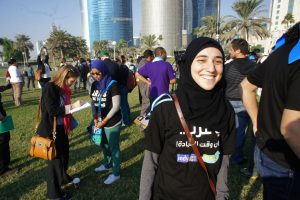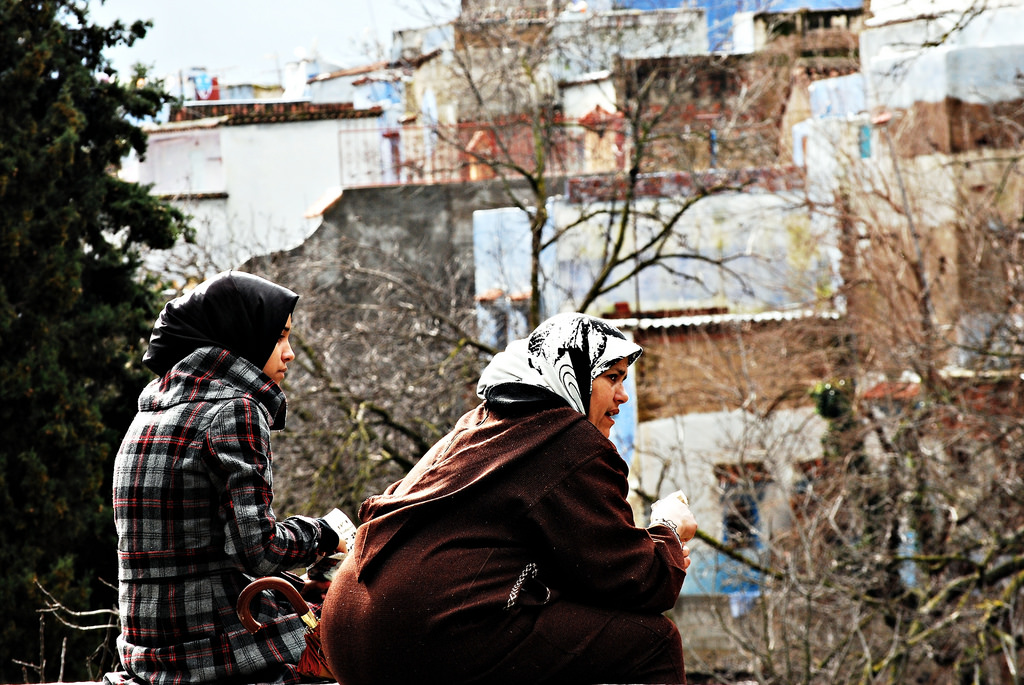Like their western counterparts typically born between the late 1970s-early 2000s, Arab millennials are progressive, open-minded, and environmentally, socially, and technologically conscious. Historian Juan Cole has documented the actions and activism of many young Arab revolutionaries, focusing primarily on the political events which started in 2010 and specifically the partially successful uprisings in Egypt, Tunisia, and Libya, where youth already had a substantial organizing presence (as opposed to Syria, where this was not the case). He ascribes Arab millennials as more left and center leaning and on average as having an increasing preference for the secularization of the state, while being somewhat polarized with a non-negligible portion supporting the fundamentalist right. These young people have become essential players in civil society, created thousands of new charitable and non-governmental organizations and have made great leaps in terms of social and individual freedoms. They are the generation poised to become the next wielders of power in the region.
Yet in spite of all this, the prospects of this generation remain ambiguous, some praising it and others noting the disenfranchisement and helplessness of Arab youth, particularly after the deflation of the Arab Spring movements. Today young Arab people feel limited and disempowered, and this comes as no surprise considering the challenges they face in terms of flailing economies, limited job opportunities, rise of extremist groups, a power-hungry ruling class, political instability, civil conflicts and foreign interventions, and the aversion of their own societies to progress and development.
Some of these challenges are addressable, others may only be resolved with the passage of time, but in the meantime, there is much that young Arabs can do to empower and ready themselves for creating change and maintaining the success of their movements, even outside the direct realm of political and economic instability.
Aversion to Political Parties
Perhaps one of the best qualities of the millennial generation — and Arabs are no exception — is that today’s young people don’t like political parties; they dislike dictatorships and hierarchies, preferring to advocate for personal freedoms and human rights rather than forming parties and putting forth agendas. However, this aversion to political parties also holds young people back. Cole details this phenomenon in his book, The New Arabs: How the Millennial Generation is Changing the Middle East. Hillary Clinton also touches on the topic in her book Hard Choices, describing her meetings with Egyptian revolutionaries who seemed averse to forming a unified party that could run for elections.
This allowed revolutionaries in Egypt to be overturned by Muslim Brotherhood members who were older and had much more political influence and organizing experience. On the other hand there might be hope through lessons learned as in the example of Lebanon’s 2015 You Stink and 2016 Beirut Madinati activists, who, spurred on by years of political neglect, a presidential vacancy, garbage crisis, and the inadequacy of the political ruling class, were able to put together a secular, results-oriented, environmentally conscious municipal agenda aimed at improving civil life and city infrastructure. Despite having lost the election, these activists have made tremendous gains, winning the vote of 40% of Beirut’s citizens, giving hope to many Lebanese and Arabs young and old that change, while not immediate, was possible. Young Arabs must continue to participate and vote on a mass scale in such elections, even if they lose.
Cole writes, in The Arab Millennials Will be Back:
In the meantime, many of the millennial activists who briefly turned the Arab world upside down and provoked so many changes are putting their energies into non-governmental organizations, thousands of which have flowered, barely noticed, in countries that once suffered from one-party rule. In this way, they are learning valuable organizational skills that – count on it – will one day be applied to politics.
Young people do need to organize, but their parties don’t have to operate in the way that the current ruling parties do. They do not need to resort to hierarchies or in any way abandon the spirit of youthful, activist and horizontal movements; what they do need is to build a presence, gain negotiating experience, agree and commit to unified goals, and those horizontal movements, even if they lose today, will become the models for the prominent parties of the future.
Reading
Reading inspired many of the Arab Spring’s forefront activist youth. Tunisian activist and blogger Amira Yahyaoui admitted to having been influenced by Etienne la Boetie’s essay Discourse on Voluntary Servitude. Reading anything, whether fiction, Greek history, business strategy or feminist philosophy, opens us to new ideas and perspectives, different ways of thinking, and teaches us empathy. It gives people knowledge that better enables them to understand and communicate with each other, not to mention build new governments, improve the economy, strategize to improve political situations, build diplomatic relations, take global stances, enhance technology and research.

Young Arabs have definitely experienced a boom in literacy, especially among women, who constitute the larger portion of the illiterate population overall. Literacy rates among young women have risen to 80% in several Arab countries which took part in the revolution, and above 90% in Tunisia, Libya, Bahrain, and Lebanon. Yet, there is not much data and there are very few surveys available about Arab millennials that can show how prevalent reading is as a cultural activity, although we do know that young Arabs are active internet users, media consumers and producers. This article has a nice discussion which tries to understand the factors, such as language and copyright laws, and indicators involved in Arab readership. Evidence suggests, for example, that readership has increased among young people in Gulf countries, particularly among women.
The anecdotal feeling one gets is that knowledge gained by reading is not as valued in Arab societies, at the expense of knowledge in street smarts and business savvy, but, while there are few reliable statistics on the subject, rising Arab readership will have a lasting impact on changes in political discourse as it did prior to the French revolution as observed by the revolutionary Thomas Paine.
Dating
This might seem like an odd factor to consider, but dating plays a crucial role in building confidence and allowing young people to meet peers who help them grow, encourage them to achieve their dreams, and partner to create new values and goals. However, young Arabs are constrained in their romantic relationships; they are often under societal and familial pressure to choose someone from the same religion or sect, political affiliation, financial status, and country of origin, while ensuring that person also fits whatever personal standards they might have. Restricting this pool of ‘potential’ partners severely limits the chances that young people will meet like-minded companions, and it would not be surprising if many end up settling, i.e. adhering to group standards but ironically enough sacrificing personal standards. Such obstacles – especially that they fall outside the direct control of political and regional events and more into the personal sphere – should not continue to be yet another impediment facing the agency and empowerment of young Arabs.
Currently, civil marriages cannot be performed, or can only be performed under complicated circumstances, in countries such as Egypt, Syria, Lebanon, Jordan, United Arab Emirates, Qatar, Yemen, Libya, Mauritania, and Israel; which means in the case of people from different sects or religions, one person would be forced to convert, likely causing all kinds of problems. Inter-religious marriages should be able to happen without anyone expecting the other to give up their religion whether on paper or in practice.
On the plus side, we have seen increasing occurrences of civil marriage from young couples finding workarounds in the past few years, even same-religion, religious-practicing couples opting for it as a personal preference. This trend will likely rise as women and men become more varied in their dating choices, particularly in countries such as Morocco, Tunisia, and Lebanon.
Lawrence Rosen writes that Arab millennials have found difficulty proving their adulthood in a culture which relies on personalism and reciprocal relations rather than institutions, and this may be part of the problem:
It is also an open question whether the demonstrators imagined a truly different relation to the state… the younger generation was unable to effect the one thing (as Hannah Arendt noted) necessary to make a revolution – not just a change in ways of thinking but a change in ways of relating.
Perhaps what millennials need is to envision new ways of relating to the state, and that starts with not having the state dictate the nature of their personal relations to them.
Hatred towards the West
It’s no secret that Arabs in today’s post-colonial Middle East have a love-hate relationship with Western culture. If passed on to the younger generation, such views can hold young people back.
Arabs should not adopt all Western values, but they should be able to take their pick. They should be free to be inspired by or learn from Western culture to augment their own. They should not be restricted. They can choose secularization of the state while still embracing the importance of family values and religious faith. They can do so while still valuing individual freedom of expression and religion. (Americans had no problems borrowing from Europeans; neither Europeans from ancient Greeks nor from 12th century Arabs!)
They cannot complain that they want the progress, wealth, and prosperity that Western cultures enjoy, and then reject ideals such as proper laws, respect for human rights, tolerance, investment in technology, and secularism in politics.
Arabs restrict themselves by refusing to adopt certain values simply because they are Western, out of fear that such ideals will somehow corrupt or taint their conception of their cultural purity which doesn’t even exist.
Perhaps Arabs should also consider merging hatred of Israel into this category – while continuing to advocate and demand accountability for the continued oppression and crimes of Israeli governments against the people of Palestine and the Levant – because this hatred is obsessive and blinds Arabs, is easily usable against them, and provides an easy target to blame rather than focusing such emotions towards creating their own solutions to problems.
Arab Millennials seem to be moving away from this hatred, as Cole also writes:
There’s a feeling amongst [millennials] that the old dictatorial regimes would use Israel and American foreign policy as ways of deflecting critiques of how their country was actually run when it came to domestic policy.
Women
The empowerment and education of women is directly related to better family planning and the rise of the middle class. But it’s imperative for Arabs to go beyond that and start putting women right in the center of political innovation, creativity, and decision making. Because if Arab millennials are disempowered, the women of this generation are doubly, and triply, and quadruply disempowered. Studies show that despite getting more university education than men, Middle Eastern women make up a much smaller portion of the workforce and decision-making arena. In Lebanon, women constitute 54% of university students but only 26% of the workforce and 8% of legislators, senior officials and managers; in Qatar, they constitute 63% of university students but only 12% of the workforce and 7% of legislators, senior officials and managers. Compare that with the United States, where women constitute 60% of university students, 47% of the labor force and 20% of legislators.
It’s been evidenced that diverse perspectives make better teams. Each member contributes skills to the decision-making process. One may be good at aggressively taking risks, the other at heeding caution and knowing when to think ahead. One may be firmer, the other more empathetic. One may be good at diplomacy and communications, the other at analytics. (These are examples, not necessarily male or female dimensions.) All these qualities are important for decision-making, and the more diverse the experiences and ways of thought, the higher the chances that a greater range of problems will be solved, and that better quality solutions will result.
It’s precisely that women and men are different and have had different life experiences, that both are needed when making political decisions. It would be equally wrong to have only female perspectives represented.

Indicators show that Arab millennials strongly value gender equality. Young Arab women in Egypt and Tunisia and the countries of the Arab Spring were an integral part of the revolutions, taking to the street and rallying with fellow activists, and maintaining a prominent online presence. In Lebanon’s Beirut Madinati team, women were equally represented on the ballot.
Women are crucially and vitally needed as peacemakers, leaders, diplomats, conflict-resolvers, and economic decision-makers, and will play an essential role in Arab millennials’ comeback. Their right to having an equal say in Arab society needs to be brought to the forefront rather than continuing to be sidelined as “women’s issues”.
It’s not surprising that young Arabs feel disillusioned and disempowered, but in many of their societies they have continued and will continue to make a comeback on both the cultural and political fronts. This article has only attempted to brush the surface and has focused on the organizational and societal, but not the economic, where young Arabs also face critical impediments in terms of unemployment and job opportunities.
Young Arabs do have the ability to make differences in their day-to-day personal and societal lives, even outside the realm of regional and political influences. They have already proven their ability to create change, and now they must make their political presence known, even if it takes some time for that presence to influence their societies; they must actively organize, participate in and vote on a mass scale in elections and organizations; they must persist in adhering to personal and social freedoms, embracing new perspectives including those of women, and they must start envisioning the state as an institution and not as an entity with the power to govern their personal relations.
This piece originally appeared at Reformer Magazine, and has been reprinted with permission.
Header photo: Davidlohr Bueso/Creative Commons

